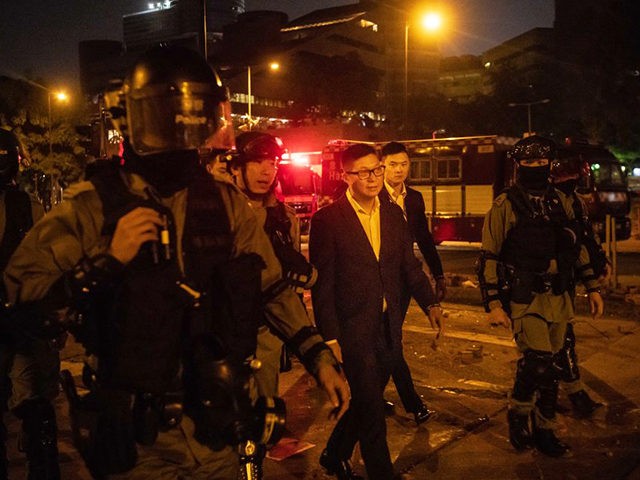Chinese state media confirmed Thursday that Hong Kong Police Commissioner Chris Tang will visit Beijing this weekend for meetings at the Communist Party’s Public Security Ministry.
Tang became commissioner last month after incumbent Stephen Lo retired; Chinese media warmly welcomed Tang as a more “hardline” police chief willing to use violence against pro-democracy protesters more avidly. The signature event of Tang’s tenure so far has been the siege of Hong Kong Polytechnic University (PolyU), in which officers trapped student civilians for days on campus with little food or water.
The Chinese government-run propaganda publication Global Times reported that Tang will leave Hong Kong for Beijing on Friday and, according to Hong Kong officials, will meet the Public Security Ministry and the nation’s State Council. The spokesperson confirming the trip reportedly did not provide any additional details about why he was making the trip now. The newspaper does note that his return to Hong Kong will coincide with a legal pro-democracy march organized by the Civil Human Rights Front, a Hong Kong group that has helped organize peaceful rallies and marches urging the Hong Kong government to stand its ground against Chinese communism.
“While in Beijing Tang is expected to meet with State Councilor and Minister of Public Security, Zhao Kezhi, and Zhang Xiaoming, director of the Hong Kong and Macao Affairs Office,” the Times said, citing local reports. The newspaper refers to the trip as “simply following protocol.”
The Global Times applauded Tang as a successor to Lo, calling him “more hawkish than his predecessor” and expecting more “effective and decisive” police action against peaceful dissidents.
The Hong Kong protest movement erupted in June in response to proposed legislation allowing China to abduct anyone present in Hong Kong if Beijing accused them of anti-communist activities. While the extradition bill no longer exists thanks to the efforts of the protesters, dissidents have issued four other demands of the Beijing-controlled Hong Kong government, among them an independent probe into multiple accusations of police brutality against protesters, many of them caught on film.
Police responding to organized marches have extensively used tear gas, pepper spray, water cannons, rubber bullets, bean bag rounds, and even live fire at close range against the protesters. They have attacked journalists on site to report on the protests and limited health workers’ access to protesters suffering from police attacks. As many in the protest movement are teens, police have stormed playgrounds attempting to intimidate protesters into silence.
On Wednesday, Hong Kong Welfare Secretary Law Chi-Kwong defended the extensive use of tear gas to attack peaceful protesters by declaring it safe to inhale.
“For the dioxins resulting from tear gas, I think it has been found from the literature that it is minimal or even nonexistent,” Law claimed. “In fact, when compared with dioxins resulting from our barbecue activities, I think the level is indeed very minimal.”
Early on in the protest movement, outgoing police chief Stephen Lo appeared to cede to one of the other four demands the protesters are making: an end to calling their peaceful protests “riots.” “Rioting” is a crime heavily punished in Hong Kong; defining all protesters as “rioters” implies potential time in prison for anyone taking the streets to demand respect for their civil rights.
“I did not mean that all those taking part in the protests that day were taking part in rioting,” Lo said in June. “And they need not worry that they could have committed riot offences.”
Hong Kong Chief Executive Carrie Lam appears to have later backed the goverment down from Lo’s statement and has refused all four of the remaining demands. The other two are freedom for political prisoners and the direct election of lawmakers.
Keeping the Legislative Council in the hands of Beijing-controlled special interests, and not putting most seats up for a vote, prevented the pro-democracy candidates from sweeping the legislature, if last month’s district council elections are any indication. District Council seats are on the ballot, but District Councils only draft local laws in their neighborhoods. All 17 of 18 councils in the city went overwhelmingly to anti-China candidates.
The minority of pro-democracy candidates still in power in the Legislative Council attempted to impeach Carrie Lam on Thursday, but were overwhelmed by votes from the special interest lawmakers. The opposition had attempted to do so before, but protesters stormed the legislature’s headquarters in June and destroyed the lawmaking floor in an attempt to keep the extradition bill from passing. The vote on impeachment did at least grant lawmakers the opportunity to raise the issue of police brutality.
“No one had too little freedom and dignity to lose in our society. Our compatriots took to the streets with the knowledge they might be subject to police brutality and they might be jailed for multiple years if convicted,” Civic Party lawmaker Alvin Yeung said, praising the protesters.
Follow Frances Martel on Facebook and Twitter.

COMMENTS
Please let us know if you're having issues with commenting.